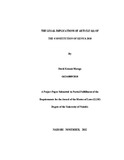| dc.description.abstract | Prior to the promulgation of its 2010 Constitution, Kenya followed the dualist system in
domesticating the treaties it ratified. Article 2(6) of the 2010 Constitution now
incorporates into Kenyan law all treaties ratified by Kenya. This thesis examines what
informed that change and the legal implications of that provision read together with the
Ratification of Treaties Bill. It concludes that besides the switch from being a dualist to
a hybrid system incorporating both dualist and monist aspects of domesticating treaties,
Kenya is going to subject to public scrutiny and parliamentary approval all treaties it is
party to including military alliances which may have security implications. Along with
approval for ratification, Kenyan Parliament will legislatively domesticate treaties that it
ratifies. Any ratified but undomesticated treaties or portions thereof will be justiciable.
Despite delays that will be occasioned by the ratification process, the change will
interrogate the implications treaties will have on Kenya before they are ratified and
engender accountability. | en |

